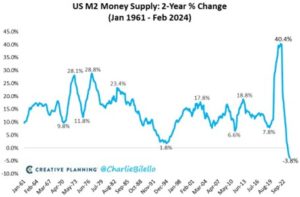
April 1, 2024
Soft Landing
If you’ve been listening to the financial news for the past year, you’ve probably heard many times the phrase “soft landing” when it comes to the Federal Reserves goal of reducing inflation. The Fed set out on a phase of tightening in the spring of 2022 after realizing inflation wasn’t so “transitory.” Those rate increases were very difficult for the stock and bond markets to digest in 2022, but we haven’t seen the broader economic pullback that most economists predicted in 2023/early 2024.
A “soft landing” implies a reduction in inflation without a broader economic collapse. In the Federal Reserve committee statement on March 20th, they said, “recent indicators suggest that economic activity has been expanding at a solid pace. Job gains have remained strong, and the unemployment rate has remained low. Inflation has eased over the past year but remains elevated. The Committee seeks to achieve maximum employment and inflation at the rate of 2 percent over the longer run.” The Fed wants to get inflation back to their target rate of 2%, and so far they’ve done a relatively good job bringing inflation down while not sending the economy into a tailspin. We aren’t back to the goal (2%), but it does take time to drain all of the financial excess that went into the economy during the Covid crisis. See below:

The US money supply has fallen 3.8% over the last 2 years, which is the largest 2-year decline on record, but it follows a 40% increase in 2020-2021. Source: @charliebilello on X.com
As the economy has remained resilient, we saw very good performance from our capital growth portfolio in 2023 – up 39%. Dividend stocks in 2023 remained flat, but we think they along with small cap stocks could have a good year in 2024. With interest rates coming down, reduced borrowing costs will be a win for small businesses and investors will likely turn to dividend stocks for income when they aren’t able to get as much yield out of the bond market. This could lead to a broadening of the market which has been dominated by growth stocks, enabling small caps and dividend payers to catch up or at least gain ground. Year to date as of March 28th, the S&P 500 Market Cap Weighted Index (SPY) is up 10.16% while the S&P 500 Equal Weighted Index (RSP) is up 7.39%, indicating a broadening is taking place. Source: FactSet
We have a couple risks that I (Scott) should mention:
- The fed could go too far and hold rates too high for too long, leading to a recession.
- This is an election year and we have two primary candidates with a lot of baggage. This likely brings some volatility, but we don’t think it derails the economy.
Overall, there are quite a few positive forces supporting the stock market:
- The majority of stocks are reasonably valued despite some growth stocks being expensive.
- The economy is holding up well.
- Inflation is on the way down.
- Interest rate cuts are likely this year – good for dividend stocks and small caps.
In the meantime, we will endeavor to continue to invest in solid businesses that will support our client’s growth and income goals. We sincerely appreciate the confidence you have placed is us. If you have any questions, please don’t hesitate to reach out to us.
Investing involves risk including the potential loss of principal. No investment strategy can guarantee a profit or protect against loss in periods of declining values.
Diversification does not guarantee profit nor is it guaranteed to protect assets.
Fixed income investments are subject to various risks including changes in interest rates, credit quality, inflation risk, market valuations, prepayments, corporate events, tax ramifications and other factors.
Opinions expressed are subject to change without notice and are not intended as investment advice or to predict future performance.
Neither the named representative nor Investment Advisor gives tax or legal advice. All information is believed to be from reliable sources; however, we make no representation as to its completeness or accuracy. Please consult your tax professional for specific guidance.
The Standard & Poor’s 500 (S&P 500) is an unmanaged group of securities considered to be representative of the stock market in general.
